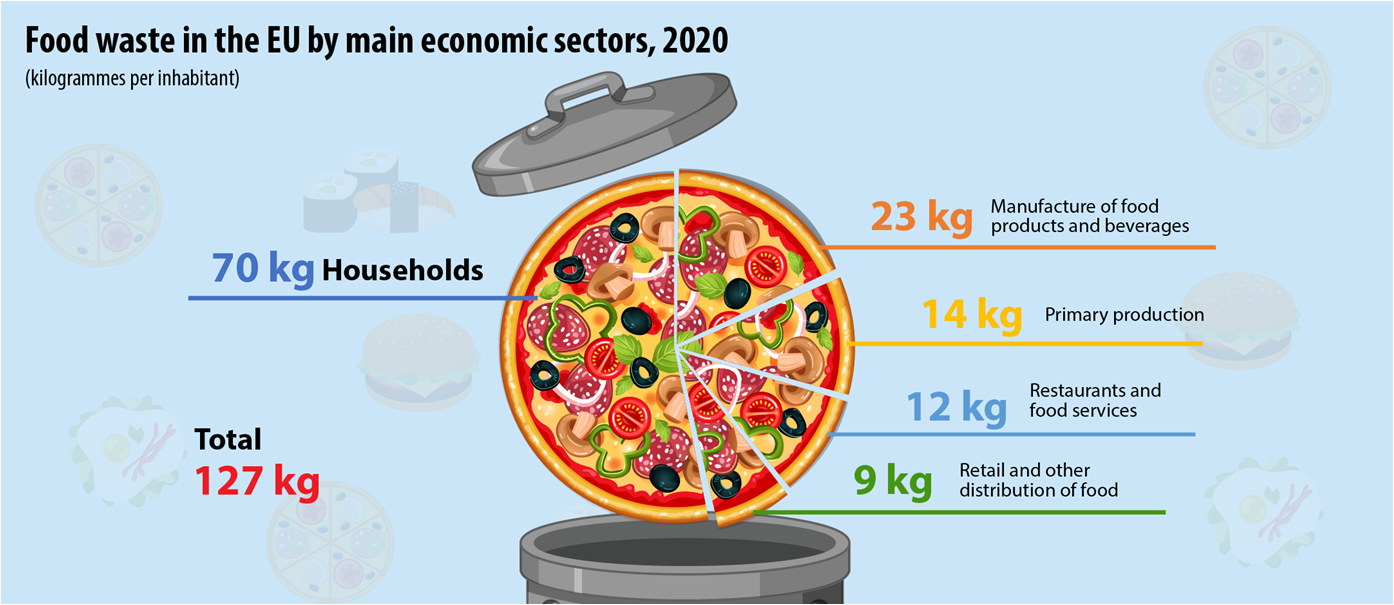With the support of the PLAC III project, a proposal for the policy of donating food and preventing food waste was prepared, as well as recommendations for harmonisation of the existing legal framework with Union acquis.
Preventing and reducing food waste is one of the important measures of the EU's "Farm to Fork" strategy, which aims to create sustainable food systems. The European Union has pledged to halve per capita food waste at the retail and consumer levels by 2030, which now amounts to 173 kilograms per capita per year.
For that reason, the revised Waste Framework Directive was adopted on 30 May 2018, requiring Member States to reduce food waste at each stage of the food supply chain. Moreover, it lays down obligations for Member States to prepare food waste prevention programmes as well as redistribution of food surplus for human consumption. The focus of food waste prevention should be to act directly at the source by limiting the generation of surplus food at each stage in the food supply chain (i.e. production, processing, distribution and consumption). If this cannot be achieved, the best destination for food surplus is to redistribute this food for human consumption where safe to do so.
The European Commission amended EU food hygiene rules in order to lay down certain requirements to promote and facilitate food donation, whilst guaranteeing its safety for consumers. These amendments concern the Regulation (EC) 852/2004 on the hygiene of foodstuffs, where a new chapter was added - on food redistribution that addresses how the "use by" and "best before" dates shall be applied in the context of food redistribution while not jeopardising food safety. The amendments were also made to the Regulation (EC) 853/2004 on specific hygiene requirements for food of animal origin, stating that freezing of meat at retail would be authorised under certain conditions, aiming to facilitate the safe redistribution of meat products by food banks and other charities.
In June 2020, the European Commission adopted guidance on food safety management systems for food retail activities, including food donations (the EU Food Donation Guidance).
In Serbia, according to estimates, about 247 thousand tons of food is thrown away annually, which is about 30-40 kg per inhabitant. In 2019, the Council for Philanthropy of the Government of the Republic of Serbia established a Working Group to improve the legal framework for donating surplus food, which produced a draft for the rulebook on food donation. Through a GIZ-implemented project on better food waste management, a Guide for the proper management of food waste was prepared for the catering services sector and other commercial and public entities that generate food waste through their work.
In order to have a policy proposal in this area, the PLAC III project provided expert support to the Ministry of Agriculture, Forestry and Water Management in the preparation of a legal gap analysis of the existing framework in Serbia against relevant Union acquis. Project expert Marija Batinić Sermek presented the results of the analysis at a workshop held on 12 December. She said, among other, that there is no separate planning document for the food waste prevention.
As examples of best practice in the EU, she showcased food waste prevention and donation policies in Italy, France and Croatia. Recommendations for Serbia, according to Batinić Sermek, include designation of one competent body and adoption of a national strategy, which will assign implementation roles. It is necessary to develop a system for measuring the amount of food waste according to the EU methodology and to define a way of monitoring the amount of donated food. It is recommended to define the legislative framework for food donation and harmonise a set of horizontal legal acts related to food donation (expiry dates, labelling, freezing of donated food, and shelf life of eggs). It is also recommended that food donating should be exempt from VAT paying.
Representatives of the Ministry of Agriculture, Forestry and Water Management participated in the workshop.




